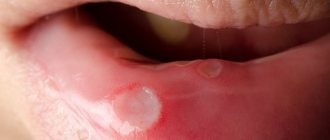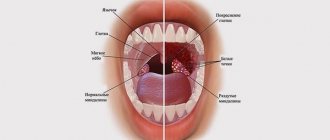An unpleasant odor emanating from the oral cavity causes psychological discomfort, reduces self-esteem, and can signal various pathologies in the body, systemic diseases, and physiological disruptions in the functioning of internal organs.
The reason does not always lie in insufficient hygiene or dental diseases. The smell of ammonia from the mouth in adults may indicate problems in the functioning of the digestive tract, impaired functioning of the kidneys, liver, as well as the presence of other health problems in a person.
Causes of ammonia odor from the mouth
The content of the article
An unpleasant specific urine (ammonia) odor from the mouth can appear for a variety of reasons. Lack of proper oral hygiene, systemic diseases, exacerbation of chronic pathologies, the presence of bacterial flora, endoparasites in the body. Consumption of food can be one of the causes of bad breath.
Important! To determine the root cause of ammonia breath, undergo a comprehensive diagnostic examination at a medical center.
The main causes of urine stench from the oral cavity:
- disruption of metabolic processes in the body;
- unbalanced nutrition, protein, low-carbohydrate, express diets, fasting;
- disruptions in the functioning of the endocrine system and gastrointestinal tract;
- ENT diseases;
- diseases of the oral cavity (caries, gingivitis, stomatitis);
- bacterial, viral, parasitic diseases, infections;
- chronic kidney pathologies;
- bad habits (abuse of alcohol, nicotine);
- dehydration, intoxication of the body.
Ammonia is a natural waste product in the body. It is formed during the digestion of proteins and amino acids. The kidneys are responsible for removing metabolic products. Therefore, most often a metallic taste in the mouth and an ammonia odor from the oral cavity are experienced by people who have been diagnosed with problems in the functioning of the genitourinary tract.
Urine aroma from the mouth is one of the characteristic symptoms of disorders in the genitourinary tract. If there is a malfunction of the kidneys, tubular dysfunction, renal failure, dystrophy, as well as stones in the bladder, the processes of removing metabolic products (decomposition) from the body are disrupted.
Carrying through the bloodstream, they penetrate the lungs and become part of the air that we exhale. In case of renal failure, pyelonephritis, the smell of urine can emanate from the entire body.
Important! If the disease is in the acute stage, at the peak of its development, the smell of ammonia from the mouth will have an increased concentration.
In addition to bad breath, if the functioning of the kidneys is impaired, the following are noted: surges in blood pressure, the appearance of peripheral edema on the body, difficulty urinating, pain in the lumbar region, anemia of the mucous membranes.
Stale ammonia breath and a specific taste in adult patients are noted when:
- gastritis, peptic ulcers;
- pathology of the bile ducts, cholelithiasis;
- increased stomach acidity;
- pancreatitis;
- problems with the intestines (dysbacteriosis).
A metallic taste, a white coating on the tongue, and increased thirst may indicate the development of diabetes mellitus.
Important! A sharp uremic odor from the mouth may indicate an approaching glycemic coma. In addition to the foul odor, general health worsens, the skin and mucous membranes turn pale. The vision becomes dark, the head becomes dizzy, the heartbeat accelerates, and the overall body temperature rises.
An increase in the concentration of glucose (sugar) in the bloodstream accelerates the formation of ketone bodies, which cause the appearance of a characteristic foul odor.
Uremia
Uremia is the final stage of kidney failure. Because the kidneys can no longer filter waste effectively, substances such as urea, creatine, and other nitrogenous products accumulate in the blood rather than being excreted in the urine. The accumulation of these nitrogenous compounds often leads to urine odor in the mouth.
Uremia is a serious medical condition requiring emergency care and hospitalization. Doctors will determine the underlying cause of uremia and perform dialysis to filter the blood. Some people may need a kidney transplant.
Other causes of urine odor from the mouth
Protein diets, prolonged fasting, monotonous, unbalanced nutrition, drinking a small amount of liquid per day often lead to disruption of water-salt and electrolyte balance. If a large amount of protein food enters the body, the load on the kidneys and liver increases significantly.
Medicines, protein complexes, and nutritional supplements can also cause bad breath. Especially if pharmacological preparations, mineral and vitamin complexes contain nitrogen-containing substances, amino acids, and proteins.
Abuse of alcohol, drugs, and bad habits lead to irreversible consequences in the body and provoke the development of various systemic pathologies and functional disorders.
A constantly emanating uremic aroma indicates a violation of biochemical processes in our body. Therefore, in order to eliminate and neutralize the stench, it is important to establish the root cause of ammonia “amber”.
Chronic kidney disease (CKD)
CKD includes a number of diseases and disorders that damage the kidneys and limit their ability to filter waste from the body. This leads to a severe buildup of toxins in the body, including ammonia, resulting in urine odor.
Other complications that can result from CKD include anemia, high blood pressure, abnormal electrolyte levels, fluid build-up, heart disease, increased risk of stroke and heart attack, and kidney failure.
Several factors can increase the risk of CKD, including diabetes, drug abuse, high blood pressure and a family history of kidney disease.
There is no cure for CKD, so treatment is aimed at relieving symptoms. People with CKD must make lifestyle changes and may also take medications for high blood pressure and high cholesterol.
People with severe CKD may need dialysis or a kidney transplant.
Symptoms, diagnosis
Excess ammonia in the body can lead to a deterioration in general condition, malfunction of internal organs, slowdown of metabolism and metabolic processes at the cellular level. A person feels a sour-sweet taste, severe weakness, fatigue, irritability, and a deteriorating emotional state. Severe headaches, fever, sudden mood swings are possible.
A strong uremic odor from the mouth can occur in adults at any age. Only by establishing the root cause can you select adequate treatment and effective techniques that will restore fresh breath. It is necessary to undergo a comprehensive diagnostic examination at a medical center.
Important! Therapeutic methods and pharmacological agents should be prescribed by a doctor based on the diagnostic results. Self-medication can only aggravate the situation and lead to the development of serious complications and health problems.
It is necessary to undergo examination by a gastroenterologist, therapist, endocrinologist, or dentist. It is imperative to do an ultrasound of the internal organs, a general and biochemical blood test.
Stomach infection
A common bacterium called Helicobacter pylori (H. pylori) is present in nearly half the world's population. However, most people do not have any symptoms. H. pylori is a bacterium that lives in the stomach, causes inflammation and ulcers, and can lead to stomach cancer in infected people. Ammonia or urine odor on the breath is a common symptom of this bacteria.
Additional symptoms of H. pylori complications may include persistent stomach pain or discomfort, lack of appetite, nausea or vomiting, bloating, weight loss, and dark-colored stool.
Treatment of infection
- proton pump inhibitors, which reduce acid production in the stomach;
- a course of antibiotics;
- treating complications such as ulcers or cancer.
Treatment
Drug therapy, regimen, course, and duration of treatment are selected individually in each specific case. The choice of treatment methods depends on the root cause, age, and general physiological condition of the person.
Patients may be prescribed:
- enzyme agents;
- symptomatic medications;
- immunomodulators;
- hepatoprotectors;
- antibacterial, antiparasitic complex drugs;
- diuretics, hormones;
- anti-inflammatory drugs.
If bad breath is caused by acute or chronic pathologies or diseases, much attention is paid to symptomatic therapy and complex treatment.
Aerosols that suppress the development of pathogenic flora and special antiseptic solutions will help:
- Stopagin. A complex drug with a pronounced antiparasitic and antibacterial effect. Prescribed for rinsing.
- Chlorhexidine. Has an aseptic, bactericidal effect. Used to treat pathologies of the urinary system.
- Hexoral. An effective remedy for the treatment of dental diseases.
If endocrine disorders are diagnosed, treatment therapy is carried out under the supervision of the attending physician. Drugs are prescribed to suppress the activity of the thyroid gland, normalize its functioning, and secretory activity. For thyrotoxicosis, radioactive iodine is used.
For renal diseases, drug therapy depends on the form and stage of the underlying disease. Diuretics, anti-inflammatory, and antibacterial agents with complex effects may be prescribed, the action of which is aimed at relieving the clinical symptoms of the disease.
If uremic stench is provoked by strict diets, prolonged fasting, unbalanced nutrition, the attending physician or nutritionist will adjust the diet and prescribe a special diet to normalize metabolic processes and water and electrolyte balance in the body.
Additional features of the causes of the symptom
In men
Great physical activity on the body, protein intake, and abuse of meat or alcohol can affect the taste in the mouth
Among women
It is worth noting! During menstruation, the female body undergoes restructuring. Hormonal changes associated with this period can cause an ammonia smell.
Another reason for bad breath is pregnancy . During this period, a restructuring of the body occurs, in particular a violation of fat metabolism.
The number of ketone bodies in the mother's blood may increase at 15-17 weeks.
Their concentration can be affected by: heredity, general condition, diet, bad habits, chronic diseases and stress.
During pregnancy, the taste of acetone in the mouth is considered normal.
If you experience a taste of ammonia in your mouth that does not go away within 2-3 days , you should consult a doctor.
What to do to treat and eliminate the symptom based on the reasons stated above?
Treatment is prescribed by the doctor based on the reasons that caused the symptom.
When diabetes , a specific diet is prescribed, blood glucose levels are monitored, and insulin is prescribed.
Keep in mind! In addition, the patient should engage in physical therapy and increase physical activity.
If kidney diseases , which are divided into infectious and non-infectious, the doctor prescribes antibiotics, hormonal and diuretic drugs .
Additionally, physiotherapy, herbal medicine and vitamins and minerals are prescribed.
In the treatment of thyrotoxicosis the following is used:
- Drug treatment , which consists of taking drugs that reduce the activity of the thyroid gland.
- Radioactive iodine , which, when accumulated in the body, destroys the functioning of the thyroid gland.
- Surgical intervention if the above methods do not help in treatment. The operation consists of removing the focus of thyrotoxicosis localized in the thyroid gland.
Treatment must be carried out with a mandatory diet , which is compiled individually for each patient.
Important! Be sure to control the amount of liquid you drink. This is necessary for proper kidney function.
You should drink at least 2 liters of water per day.
If the diagnosis does not reveal any abnormalities in the human body, then you can get rid of the unpleasant odor with the help of
antiseptic drugs : Chlorhexidine, Hexoral, Stopangin.
They help suppress the oxidative reaction of the metabolism of pathogenic bacteria.
You should rinse your mouth with the medications 2 times a day.
Folk remedies
You should know! Using folk remedies will help get rid of the ammonia taste in the mouth:
- St. John's wort tincture. She needs to rinse her mouth after any meal. To prepare, you will need 30 drops of alcohol tincture, which are diluted with 1 glass of water.
- Strawberry tincture. She needs to rinse her mouth after any meal. To prepare, you will need 1 tablespoon of dried strawberry leaves, which are brewed in 2 cups of boiling water.
- Olive oil. You need to take 1 teaspoon of olive oil and rinse your mouth with it.
- Coffee beans. To eliminate the unpleasant odor, just chew a few coffee beans.
- Tincture of oak bark. She needs to rinse her mouth after any meal. To prepare, you will need 1 teaspoon of bark, which is poured with 200 ml of boiling water.
- Beeswax. You need to melt the beeswax in a water bath, add honey, lemon juice, and a few drops of mint or tea tree essential oil. Cool the mixture and roll it into balls. This gum can be chewed several times a day.
Diagnosis and which doctor to contact
Stay up to date! To establish an accurate diagnosis, it is necessary to seek advice from a therapist, who will refer, if necessary, for additional examination to specialized specialists.
You will also need to take urine and blood tests .
Quite often, the doctor will refer you for an ultrasound examination of the pelvic organs and thyroid gland.
This is done in order to exclude pathologies of the genitourinary and endocrine systems.
Useful video
From this video you will learn which disease symptoms bad breath can cause:
Bad breath causes discomfort when communicating with other people , which leads at a minimum to poor health, mood, and at most to neurosis and loss of social connections.
In order to avoid the problem of ammonia taste in the mouth, you need to eat a balanced diet, lead a healthy lifestyle, sleep more and do exercises every morning.
If the symptom is already bothering you, you should consult a doctor. Timely medical care will help preserve health and prevent serious consequences.










